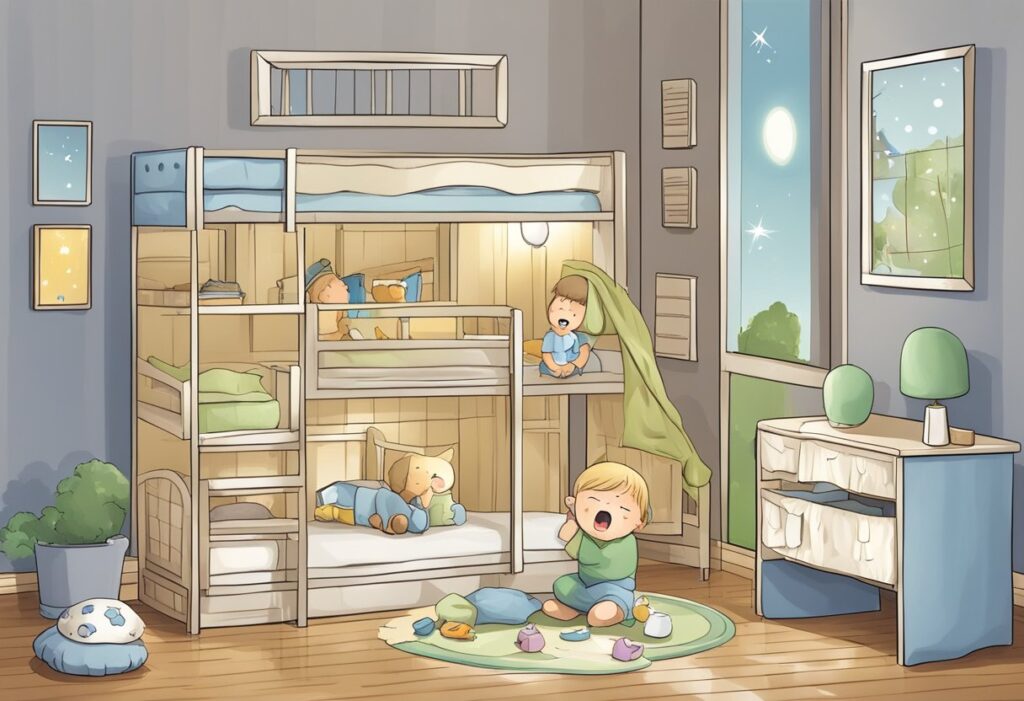If you’re a parent of a toddler, you’ve probably experienced the frustration of a child who wakes up crying in the middle of the night. It can be difficult to determine why your toddler is crying and how to soothe them back to sleep. In this article, we will explore some of the common reasons why toddlers wake up crying and what you can do to help them.

One possible reason why your toddler is waking up crying is due to night terrors. Night terrors are different from nightmares and can be very distressing for both the child and the parent. During a night terror, your child may appear to be awake but is actually still asleep and may be screaming, sweating, and thrashing around. It’s important to remember that your child is not aware of their surroundings during a night terror and may not even remember it in the morning. We will discuss night terrors in more detail later in the article.
Another reason why your toddler may be waking up crying is due to separation anxiety. Separation anxiety is a normal part of toddler development and usually begins around 8-9 months of age and can last until around 2 years old. Your child may cry and become upset when you leave the room or when they wake up and realize you’re not there. We will discuss strategies for dealing with separation anxiety later in the article.
Understanding Toddler Sleep
As a parent, understanding your toddler’s sleep is crucial to ensure they are getting the rest they need. Toddlers between the ages of 1 and 3 years old typically require 12-14 hours of sleep per day, including naps. However, every child is different, and some may require more or less sleep.
One important factor in a toddler’s sleep is their circadian rhythm, which is the body’s internal clock that regulates sleep and wake cycles. It’s essential to establish a consistent sleep schedule and routine to help regulate your toddler’s circadian rhythm. A regular sleep schedule can also help your child fall asleep more easily and stay asleep throughout the night.
Creating a bedtime routine can also be helpful in promoting healthy sleep habits. A bedtime routine can include activities like a bath, reading a story, or singing a lullaby. The routine should be consistent and occur at the same time every night to signal to your child that it’s time to sleep.
Naps are also an important part of a toddler’s sleep routine. Toddlers typically require one or two naps per day, depending on their age and sleep needs. It’s important to establish a consistent nap schedule and routine, just like with bedtime.
If your toddler is having trouble sleeping, sleep training may be an option to consider. Sleep training can help your child learn to fall asleep independently and stay asleep throughout the night. However, it’s important to approach sleep training with caution and to consult with your child’s pediatrician before beginning any sleep training methods.
Overall, understanding your toddler’s sleep needs and establishing a consistent sleep schedule and routine can help promote healthy sleep habits and ensure your child is getting the rest they need.
Why Your Toddler May Be Waking Up Crying
As a parent, it can be distressing to hear your toddler crying in the middle of the night. There are several reasons why your toddler may be waking up crying, so it’s important to understand what might be causing the issue.
Not Enough Sleep
One of the most common reasons why toddlers wake up crying is because they are not getting enough sleep. Toddlers need between 11-14 hours of sleep per day, including naps. If your toddler is not getting enough sleep, they may wake up crying or be fussy throughout the day. To ensure your toddler is getting enough sleep, establish a consistent bedtime routine and stick to it as much as possible.
Nightmares and Night Terrors
Nightmares and night terrors are another reason why your toddler may be waking up crying. Nightmares are bad dreams that occur during the REM (Rapid Eye Movement) phase of sleep. Night terrors, on the other hand, occur during the non-REM phase of sleep and can cause your toddler to scream, cry, and appear to be in distress. Both nightmares and night terrors are common in toddlers and usually resolve on their own. However, if they persist, speak to your pediatrician for advice.
Hunger
If your toddler is waking up crying in the middle of the night, hunger may be the culprit. Toddlers have small stomachs and may need to eat more frequently than adults. Ensure that your toddler is getting enough to eat during the day and offer a small snack before bedtime if necessary.
Teething
Teething can be a painful process for toddlers, and it can disrupt their sleep. If your toddler is waking up crying and seems to be in pain, teething may be the cause. Offer a teething toy or a cold washcloth to help soothe their gums.
Illness
If your toddler is waking up crying and seems to be in pain or discomfort, it could be a sign of an underlying illness. Ear infections and urinary tract infections are common in toddlers and can cause pain and discomfort. If you suspect your toddler may be ill, speak to your pediatrician.
Overstimulation
Toddlers are easily overstimulated, and this can cause them to have trouble falling asleep or wake up crying in the middle of the night. Limit screen time before bedtime and ensure that your toddler’s sleeping environment is quiet and dark.
In conclusion, there are several reasons why your toddler may be waking up crying, but by understanding the possible causes, you can take steps to help them sleep better.
Common Causes of Night Crying
It can be distressing to hear your toddler crying in the middle of the night. There are many reasons why your little one may wake up crying, and it’s important to figure out the cause so you can help them feel better.
Nightmares and Night Terrors
Nightmares and night terrors are common causes of night crying in toddlers. Nightmares are vivid, unsettling dreams that cause strong negative emotions, like fear or anxiety, making your child wake up crying. Often, toddlers can recall the details of a nightmare. Night terrors, on the other hand, are episodes of intense fear and agitation, occurring during deep sleep and typically without recollection upon waking. Your child may scream, cry, and even thrash around during a night terror. Both nightmares and night terrors can be caused by stress, anxiety, or changes in routine.
Pain and Discomfort
Pain and discomfort can also cause your toddler to wake up crying. This can include physical pain, like teething or a growth spurt, or discomfort from gas, acid reflux, or an ear infection. If you suspect your child is in pain or discomfort, check for signs like pulling at their ears or rubbing their gums. Talk to your child’s doctor if you suspect an underlying medical issue.
Hunger
If your toddler is waking up crying in the middle of the night, they may be hungry. Toddlers have small stomachs and may need a snack before bed or in the middle of the night. Consider offering a small, healthy snack like a piece of fruit or a cheese stick before bed to help keep your child full throughout the night.
Illness or Sickness
If your child is waking up crying and exhibiting other symptoms like a fever or cough, they may be sick. Illnesses like the flu or a cold can cause discomfort and make it difficult for your child to sleep soundly. If you suspect your child is sick, talk to their doctor and follow their recommended treatment plan.
Understanding the common causes of night crying in toddlers can help you identify the issue and provide the appropriate care for your child. Remember to always talk to your child’s doctor if you have concerns about their sleep or health.
Psychological Reasons for Night Waking
As a parent, it can be distressing to hear your toddler crying in the middle of the night. There are several psychological reasons why your toddler may be waking up crying.
Anxiety
Anxiety is a common cause of night waking in toddlers. Your toddler may be anxious about separation from you, starting preschool, or meeting new people. You can help ease your toddler’s anxiety by spending quality time with them during the day, reassuring them that you are always there for them, and creating a consistent bedtime routine.
Separation Anxiety
Separation anxiety is a normal part of toddler development, but it can be challenging for parents. Your toddler may wake up crying because they are afraid of being alone or separated from you. To help ease separation anxiety, consider leaving a nightlight on in your toddler’s room, using a comfort object like a stuffed animal, and reassuring your toddler that you will always be there for them.
Fears
Toddlers can develop fears of the dark, monsters, or other things that seem scary to them. These fears can cause night waking and crying. To help ease your toddler’s fears, consider using a nightlight, reading books about overcoming fears, and reassuring your toddler that they are safe.
New Sibling
If you have recently welcomed a new baby into your family, your toddler may be feeling jealous or left out. This can cause night waking and crying. To help ease your toddler’s transition, involve them in caring for the new baby, spend quality one-on-one time with your toddler, and reassure them that they are still loved and important.
Potty Training
Potty training can be a stressful time for toddlers, and it can cause night waking and crying. Your toddler may wake up because they need to use the bathroom or because they are afraid of having an accident. To help ease potty training anxiety, make sure your toddler uses the bathroom before bed, use waterproof mattress protectors, and reassure your toddler that accidents are a normal part of learning.
Weaning
If you are weaning your toddler from breastfeeding or bottle feeding, it can be a difficult transition for them. Your toddler may wake up crying because they miss the comfort of nursing or bottle feeding. To help ease the transition, consider offering a comfort object like a stuffed animal or blanket, spending quality time with your toddler during the day, and creating a consistent bedtime routine.
Nightmares
Nightmares can cause night waking and crying in toddlers. Your toddler may wake up because they are afraid or upset about something they dreamt. To help ease nightmares, consider using a nightlight, reading books about overcoming fears, and reassuring your toddler that they are safe.
By understanding the psychological reasons for night waking, you can help ease your toddler’s anxiety and promote better sleep habits.
Other Factors Influencing Night Crying

Aside from the common causes of night crying in toddlers, there are other factors that may contribute to this behavior. Here are some of them:
Environmental Factors
Your toddler’s sleeping environment can greatly affect their quality of sleep. If the room is too hot or too cold, too noisy or too bright, your child may wake up crying. Make sure the room is comfortable and conducive to sleep. Use a white noise machine or a humidifier to create a soothing atmosphere.
Overtiredness
A tired toddler is more likely to wake up crying in the middle of the night. Make sure your child is getting enough sleep during the day and at night. Stick to a consistent sleep schedule and establish a relaxing bedtime routine.
Learned Hunger
If your toddler is used to eating in the middle of the night, they may wake up crying out of habit. Try to wean your child off nighttime feedings gradually. Offer a small snack before bedtime to help them feel full and satisfied.
Asthma
If your toddler has asthma, they may wake up crying due to difficulty breathing. Make sure your child’s asthma is well-controlled and that they are taking their medication as prescribed.
Confusional Arousal
Confusional arousal is a sleep disorder that can cause a child to wake up crying, confused, and disoriented. It usually occurs during the first few hours of sleep and can last up to 30 minutes. If your child experiences confusional arousal, try to soothe them back to sleep and avoid waking them up completely.
Parasomnia
Parasomnia is a sleep disorder that involves abnormal behaviors during sleep, such as sleepwalking or night terrors. If your child has parasomnia, they may wake up crying or screaming in the middle of the night. Talk to your child’s doctor if you suspect they have this condition.
Screen Time
Excessive screen time before bedtime can interfere with your child’s sleep and cause them to wake up crying. Limit your child’s screen time and establish a screen-free bedtime routine.
Developmental Milestones
As your child reaches different developmental milestones, they may experience changes in their sleep patterns. For example, when your child is learning to walk, they may wake up crying because they want to practice their new skill. Be patient and understanding during these times.
By considering these other factors that may influence your toddler’s night crying, you can help identify and address the root cause of the behavior.
Strategies to Help Your Toddler Sleep Better
If your toddler is waking up crying frequently, it can be a challenging situation for both you and your child. Fortunately, there are some strategies you can try to help your toddler sleep better.
Establish a Consistent Bedtime Routine
One of the most effective ways to help your toddler sleep better is to establish a consistent bedtime routine. This routine should be calming and relaxing, and it should happen at the same time every night. A bedtime routine can include activities like taking a bath, reading a story, or singing a lullaby.
Address Any Sleep Issues
If your toddler is experiencing sleep issues, it’s important to address them as soon as possible. Some common sleep issues in toddlers include sleep regressions, night waking, and night terrors. If you suspect that your child has a sleep disorder, it’s important to talk to your pediatrician.
Limit Night Feedings
If your toddler is still nursing or taking a bottle at night, it may be time to start limiting those feedings. Gradually reducing the number of night feedings can help your child learn to sleep through the night.
Create a Comfortable Sleeping Environment
Make sure your toddler’s sleeping environment is comfortable and conducive to sleep. This can include a comfortable mattress, cozy blankets, and a dark, quiet room. If your child is afraid of the dark, consider using a night light.
Stick to a Consistent Schedule
Finally, it’s important to stick to a consistent schedule. This means waking up and going to bed at the same time every day, even on weekends. Consistency can help your child establish healthy sleep habits and get the rest they need.
By implementing these strategies, you can help your toddler sleep better and wake up feeling rested and refreshed. Remember, every child is different, so it may take some trial and error to find what works best for your family.



